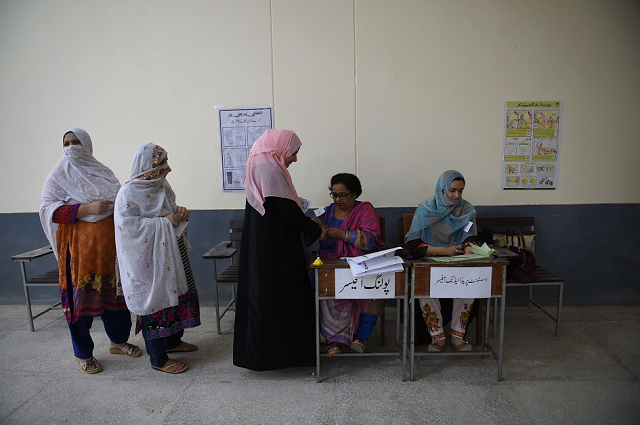Violence, fear impede women’s access to justice
Dispute resolution systems introduced by govt need legal cover, say women rights experts

Women line up to vote in the 2018 General Elections. PHOTO:AFP
This was stated by women’s rights experts and lawmakers during a seminar on ‘Understanding Barriers for Women’s Access to Justice in Pakistan’, jointly organized by the Sustainable Development Policy Institute (SDPI) and United Nations Women-Pakistan on Tuesday.
National Assembly Standing Committee on Law and Justice Chairperson Riaz Fatyana said that the government is trying to introduce the panchayat system in the country along with alternative dispute resolution laws. Together, he said, they hope to reduce the burden on the courts and provide transparent, cost-effective and speedy justice to the people, especially to women and other vulnerable groups.
A member of the ruling Pakistan Tehreek-e-Insaf (PTI), Fatyana said there are a number of laws which protect the rights of women. Some, he said, were even contradictory to each other, which requires consolidation coupled with establishing a proper process to avoid conflict and providing immediate relief to the women in distress.
Lack of awareness amongst women about their rights, prevailing illiteracy, growing poverty, rising inequality and unnecessary delays in dispensation of justice had necessitated the need for reforms in civil and criminal court procedures, especially for ensuring women’s access to justice, he said.
Fatyana further said that a proposal for establishing Qazi courts was also under consideration where victims will not require lawyers and will be provided with affordable and speedy justice.
“The Council of Islamic Ideology (CII) needs to have women’s representation as the council takes up issues, mostly related to women,” Fatyana added.
National Council on the Status of the Women (NCSW) Chairperson Khawar Mumtaz said any dispute resolution system or justice system introduced in the country should be based on consensus and must be backed by a legal and regulatory framework.
She added the issue of women’s access to justice is much bigger than we imagine.
“The challenge for us is to make our society more inclusive, especially for our minorities, who are vulnerable due to lack of access to justice,” she said.
Violence and fear of violence are the biggest barriers for women victims to get access to justice, where the conviction rate is already negligible, she lamented.
The NCSW, she said, has identified three key areas for intervention to ensure women’s access to justice, including enhancement of women’s participation at the highest decision-making levels, especially in the courts and other state institutions, economic empowerment of women and combating all forms of violence against women.
Former Judge and advocate, Riffat Butt said that all social, economic and legal barriers are interconnected and are embedded in our traditional social and religious system which discourage women to raise their voice in getting access to justice.
She urged the government and relevant authorities for the most advanced interpretation of our social and religious customs, norms, values and laws.
Butt emphasised the need for reforming the institutions involved in the dispensation of justice, which are incompetent and lack the capacity to resolve complex issues.
She also called upon the government to ensure uniformity of law across the country apart from ratifying international conventions on women’s access to justice with the necessary legislation implemented at the earliest, she added.
SDPI Senior Research Associate Rabia Manzoor said that though women’s access to justice has improved over time, there remain some social, legal and economic challenges which hinder women’s access to justice.
She further said that lack of knowledge about legal procedures, financial resources, inaccessibility of legal institutions, female staff and model police stations for women are some of the major barriers for women’s access to justice in Pakistan.
Published in The Express Tribune, May 15th, 2019.


















COMMENTS
Comments are moderated and generally will be posted if they are on-topic and not abusive.
For more information, please see our Comments FAQ